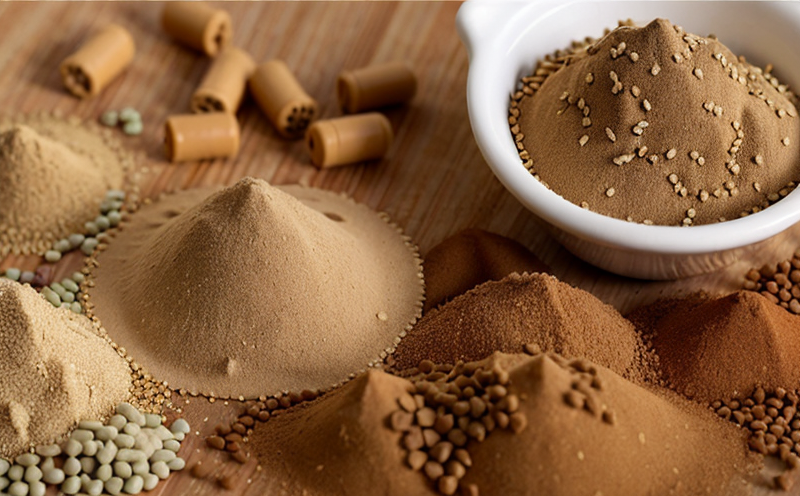Levamisole Residue Testing in Animal Feed
The presence of levamisole residues in animal feed is a critical concern that affects not only the agricultural and veterinary sectors but also public health. Levamisole, a potent anthelmintic drug used to treat parasitic infections in livestock, can accumulate in animal tissues and subsequently enter the human food chain. This accumulation poses potential risks of toxicity, particularly affecting the central nervous system. Therefore, ensuring that levamisole residues do not exceed acceptable limits is crucial for maintaining both animal welfare standards and public health.
At Eurolab, we offer comprehensive testing services to identify levamisole residues in animal feed samples. Our approach ensures accurate quantification of levamisole, enabling our clients to comply with stringent regulatory requirements set by authorities such as the European Commission (EC) and the World Health Organization (WHO). This service is particularly important for ensuring that imported feeds meet international standards.
The testing method employed at Eurolab utilizes advanced chromatographic techniques, including Liquid Chromatography Tandem Mass Spectrometry (LC-MS/MS), to achieve high sensitivity and selectivity. The process begins with the careful sampling of feed materials followed by extraction using appropriate solvents. After sample preparation, the extract is analyzed to determine levamisole levels.
The acceptance criteria for this test are based on international standards such as EC Regulation 466/2009 and ISO 18753:2015. These regulations define the maximum allowable levels of levamisole in animal feed to protect both animals and consumers. Compliance with these limits is essential for maintaining market access and ensuring consumer confidence.
To ensure consistent quality, our laboratory adheres strictly to ISO/IEC 17025 accreditation standards, which mandate stringent quality assurance protocols. Our experienced technical team ensures that all tests are conducted under controlled conditions, using state-of-the-art equipment and methodologies.
Benefits
- Educates stakeholders on the importance of levamisole residue testing in animal feed.
- Highlights how accurate quantification helps avoid potential health risks to both animals and consumers.
- Maintains market access by ensuring compliance with international standards.
- Provides peace of mind for quality managers, compliance officers, R&D engineers, and procurement teams involved in the supply chain.
By leveraging our expertise, clients can enhance their reputation as responsible stakeholders in food safety. This service not only supports regulatory compliance but also contributes to sustainable agricultural practices by ensuring that livestock are treated safely and effectively.
Industry Applications
| Application | Description |
|---|---|
| Educational Programs | Providing training on the importance of levamisole residue testing. |
| Supply Chain Management | Ensuring that suppliers meet international standards for safe animal feed. |
| R&D Innovation | Evaluating new formulations and methods to reduce levamisole residues in feeds. |
| Consumer Confidence | Guaranteeing the safety of food products derived from treated animals. |
The information provided here underscores the importance of rigorous testing in maintaining high standards of animal husbandry and public health. By addressing levamisole residues, we contribute to a safer and more sustainable agricultural sector.
Eurolab Advantages
- Accreditation: ISO/IEC 17025 accreditation ensures the highest level of quality assurance.
- Expertise: Our team comprises seasoned professionals specializing in veterinary drug residues testing.
- Technology: Utilizing advanced LC-MS/MS technology for precise quantification.
- Compliance: Ensures that all tests meet international standards and regulatory requirements.
Our commitment to excellence is reflected in our consistent accuracy and reliability. Clients can trust Eurolab to provide robust evidence supporting their compliance efforts, thereby enhancing their market standing and reputation for integrity.
Frequently Asked Questions
Veterinary Drug Residues in Animal Feed Services
- Antibiotic Residue Testing in Animal Feed
- Penicillin Residue Testing in Animal Feed
- Amoxicillin Residue Testing in Animal Feed
- Ampicillin Residue Testing in Animal Feed
- Oxytetracycline Residue Testing in Animal Feed
- Tetracycline Residue Testing in Animal Feed
- Doxycycline Residue Testing in Animal Feed
- Chlortetracycline Residue Testing in Animal Feed
- Streptomycin Residue Testing in Animal Feed
- Gentamicin Residue Testing in Animal Feed
- Neomycin Residue Testing in Animal Feed
- Kanamycin Residue Testing in Animal Feed
- Erythromycin Residue Testing in Animal Feed
- Tylosin Residue Testing in Animal Feed
- Spiramycin Residue Testing in Animal Feed
- Florfenicol Residue Testing in Animal Feed
- Chloramphenicol Residue Testing in Animal Feed
- Sulfonamide Residue Testing in Animal Feed
- Sulfamethazine Residue Testing in Animal Feed
- Sulfamethoxazole Residue Testing in Animal Feed
- Sulfadiazine Residue Testing in Animal Feed
- Quinolone Residue Testing in Animal Feed
- Ciprofloxacin Residue Testing in Animal Feed
- Enrofloxacin Residue Testing in Animal Feed
- Norfloxacin Residue Testing in Animal Feed
- Flumequine Residue Testing in Animal Feed
- Difloxacin Residue Testing in Animal Feed
- Trimethoprim Residue Testing in Animal Feed
- Clindamycin Residue Testing in Animal Feed
- Lincomycin Residue Testing in Animal Feed
- Metronidazole Residue Testing in Animal Feed
- Ivermectin Residue Testing in Animal Feed
- Moxidectin Residue Testing in Animal Feed
- Albendazole Residue Testing in Animal Feed
- Fenbendazole Residue Testing in Animal Feed
- Praziquantel Residue Testing in Animal Feed
- Coccidiostat Residue Testing in Animal Feed
- Monensin Residue Testing in Animal Feed
- Lasalocid Residue Testing in Animal Feed
- Salinomycin Residue Testing in Animal Feed
- Narasin Residue Testing in Animal Feed
- Maduramicin Residue Testing in Animal Feed
- Decoquinate Residue Testing in Animal Feed
- Hormone Residue Testing in Animal Feed
- Zeranol Residue Testing in Animal Feed
- Stilbene Residue Testing in Animal Feed
- Ractopamine Residue Testing in Animal Feed
- Clenbuterol Residue Testing in Animal Feed
- Comprehensive Veterinary Drug Residue Multi-Screening in Animal Feed





